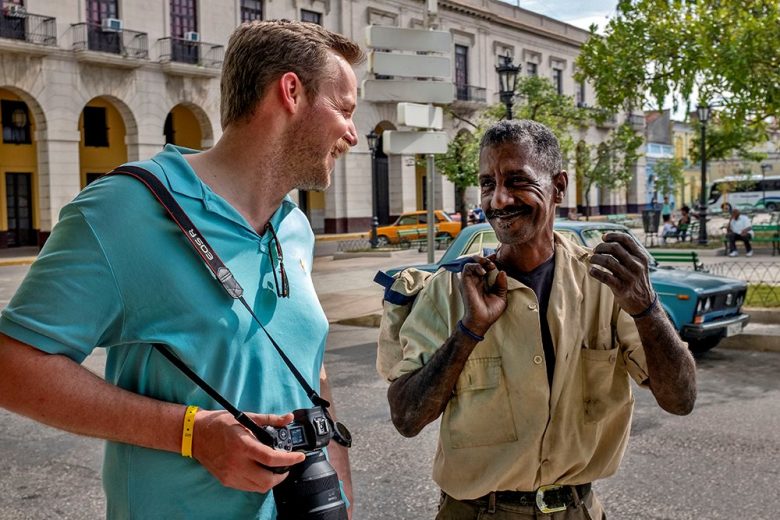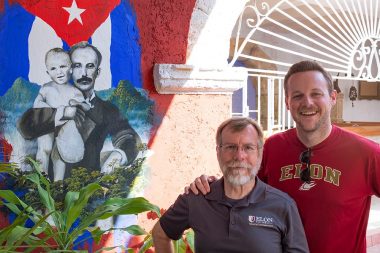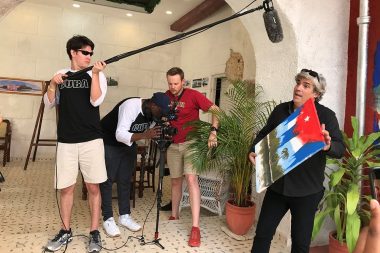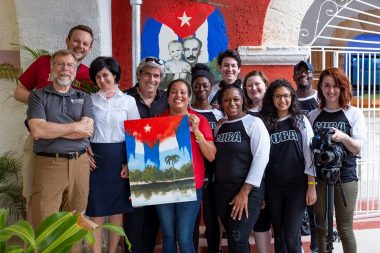The longtime broadcast journalist joined Senior Lecturer Randy Piland to offer professional expertise and guidance to Interactive Media students traveling abroad as part of a Winter Term course.

While it’s been 10 years since Pittman and Piland shared a classroom, a well-timed email last fall from professor to former pupil brought them together again in January.
For the eighth time since the start of Elon’s Interactive Media master’s program, Piland was tasked with leading a student group abroad as part of the Winter Term course Interactive Project for the Public Good. In the fall, Piland began planning a trip to Cuba with seven graduate students to highlight a renowned Cuban artist, and the Elon instructor wanted to know if Pittman was game.
 As it were, Pittman had just ventured out on his own professionally, handling corporate storytelling and video production for several organizations from his home base in Seattle. His clients include such familiar names as Microsoft and Amazon, among others.
As it were, Pittman had just ventured out on his own professionally, handling corporate storytelling and video production for several organizations from his home base in Seattle. His clients include such familiar names as Microsoft and Amazon, among others.
When Piland extended the offer, Pittman, an avid traveler, jumped at the chance.
“It turned out to be perfect timing,” Pittman said. “I had started my own production company, and Randy just happened to reach out. Previously, I would never have the vacation to take a whole week off and go to Cuba. But with my flexibility now, it was the perfect opportunity at the perfect time.”
Just after New Year’s, Pittman, Piland and seven iMedia students headed to Matanzas, Cuba, located on the northern shore of the island country – about 90 minutes from Havana. In a region known for its poets and culture – Matanzas is often referred to as “The Athens of Cuba” – the group turned their cameras on artist Jesus Alberto Mederos, who hosts art therapy sessions for youths with behavioral issues, children with cancer or other chronic illnesses, and seniors with Alzheimer's disease and dementia. The student group’s objective was to bring global attention to Mederos’ charitable efforts and to put them into the context of the larger Matanzas community.
“It was a dream story to tell,” said Pittman, who has earned several regional Emmy Awards. “Mederos has painted murals all over the city, and he’s a local celebrity there. Now he is using his clout to help others.”
The former broadcast journalist said he was really impressed by the trip’s concept as a whole, and that’s what ultimately sold him on participating. “This is not just a school project,” he said. “This was a story us professionals in the 'real world' would love to tell and I just think it's so cool that iMedia students get to have that kind of experience. I couldn't think of a better hands-on production to prepare the students for their next step.”
 For the better part of a week, the iMedia cohort chronicled Mederos and his studio, filming, photographing and interviewing individuals who took part in therapy sessions, as well as the artist himself. The group’s content, and its English-Spanish website, was featured at the iMedia fly-in presentations on Jan. 24.
For the better part of a week, the iMedia cohort chronicled Mederos and his studio, filming, photographing and interviewing individuals who took part in therapy sessions, as well as the artist himself. The group’s content, and its English-Spanish website, was featured at the iMedia fly-in presentations on Jan. 24.
“Mederos is an artist with a very big heart, and he wants to give back to the community, a community that has helped him so much,” Piland said. “We were told that for many of the people who work with him, it is the highlight of their week. You can see that people, including young children with disabilities, really seem to respond to him.”
As the graduate students worked, Piland and Pittman offered their respective expertise in photography and videography. This pairing was not out of convenience or coincidence, explained Piland.
“When I can (for these trips), I like to bring in a professional who can assist the students,” Piland said. “Video is not my expertise, so I like to those who are competent in that area and can help our students develop and gather content. This year, Mitch came to mind. I have been following him on social media, and he is actively involved in some high-end video work. So, I thought it would be great to have someone like him join our visit. Someone who could come and mentor our students and share their expertise. And he did much more than that.”
According to Piland, the graduate students responded well to Pittman’s instruction, especially his laid-back approach.
“It was very easy for our students to work with Mitch because he’s not intimidating,” Piland said. “His personality, his mannerisms, he’s someone who works well with others. And he has so much to share. Mitch benefited the whole group, not just the videographers.”
iMedia student Katie Jostes, who served as the Cuba cohort’s project manager, repeated Piland’s sentiments on Pittman. From providing recommendations on shots to sharing best practices for photojournalism, the alumnus helped the students capture worthwhile footage and content, she said.
 “Mitch's mentoring style is hands-on,” Jostes added. “He will show you how to do something, then send you out into the field to practice. He is knowledgeable and easygoing, and he adapted his advice to our preferred photo and video style. Plus, he made sure to point out important moments that we should try to capture as they happened, and gave advice on interview questions that would give us the best end result.”
“Mitch's mentoring style is hands-on,” Jostes added. “He will show you how to do something, then send you out into the field to practice. He is knowledgeable and easygoing, and he adapted his advice to our preferred photo and video style. Plus, he made sure to point out important moments that we should try to capture as they happened, and gave advice on interview questions that would give us the best end result.”
While he’s had interns accompany him, and offered mentorship to aspiring journalists, Pittman said this immersive educational trip abroad was new territory for him.
“An intern more or less just follows you around,” Pittman said. “But on this trip, the students were doing the work, and you could just usher them along and lead them into new areas. It was great to watch them discuss new skills and develop as the trip when along.
“Overall, the experience was what I would expected from Elon students. They learned and they worked hard. And I’m excited to see what they come away with."
Pittman said the most important lesson he tried to share with the iMedia students had little to do with photography and video equipment.
“So much of what we do is about engaging with people,” he said. “There are certain ways to set up a camera, lights and audio, but to really get the best quality content for your story you have to a genuine connection with people. You have to establish relationships.”
And maintaining relationships ultimately led Pittman to team up with Piland. It was an unexpected, but welcomed opportunity.
“I can’t say that when I was a student with Randy that I would have expected to be teaching with him – and traveling internationally with him – 10 years later, but I also would not have wanted it to turn out any other way,” Pittman said. “It was such a great path that Elon helped put me on, a career in television news, as well as the confidence to go out on my own. It’s all just come full circle now. And I’m incredibly appreciative that Elon invited me.”


